Pool Permits and Approvals in Dubai: The Complete Process - Your Step-by-Step Guide to Pool Installation

Here's what catches most Dubai homeowners completely off guard: building a pool without proper permits isn't just expensive - it can result in forced removal, hefty fines, and serious complications when selling your property. Dubai Municipality requires comprehensive documentation, community approvals, and safety compliance that many homeowners discover only after starting construction, creating costly delays and legal headaches.
Whether you're reading this whilst planning your pool project during December's perfect weather (ideal timing for permit applications!), frantically researching requirements after receiving a stop-work notice, or simply wanting to understand the process before committing to contractors, navigating Dubai's approval requirements correctly from the start saves thousands of dirhams and months of frustration.
The permit process isn't just a bureaucratic formality - it ensures structural safety, utility protection, and community compliance that protects both your investment and your neighbours' properties. Understanding each step, required documentation, and realistic timelines helps you plan construction schedules and avoid the permit-related delays that derail many Dubai pool projects.
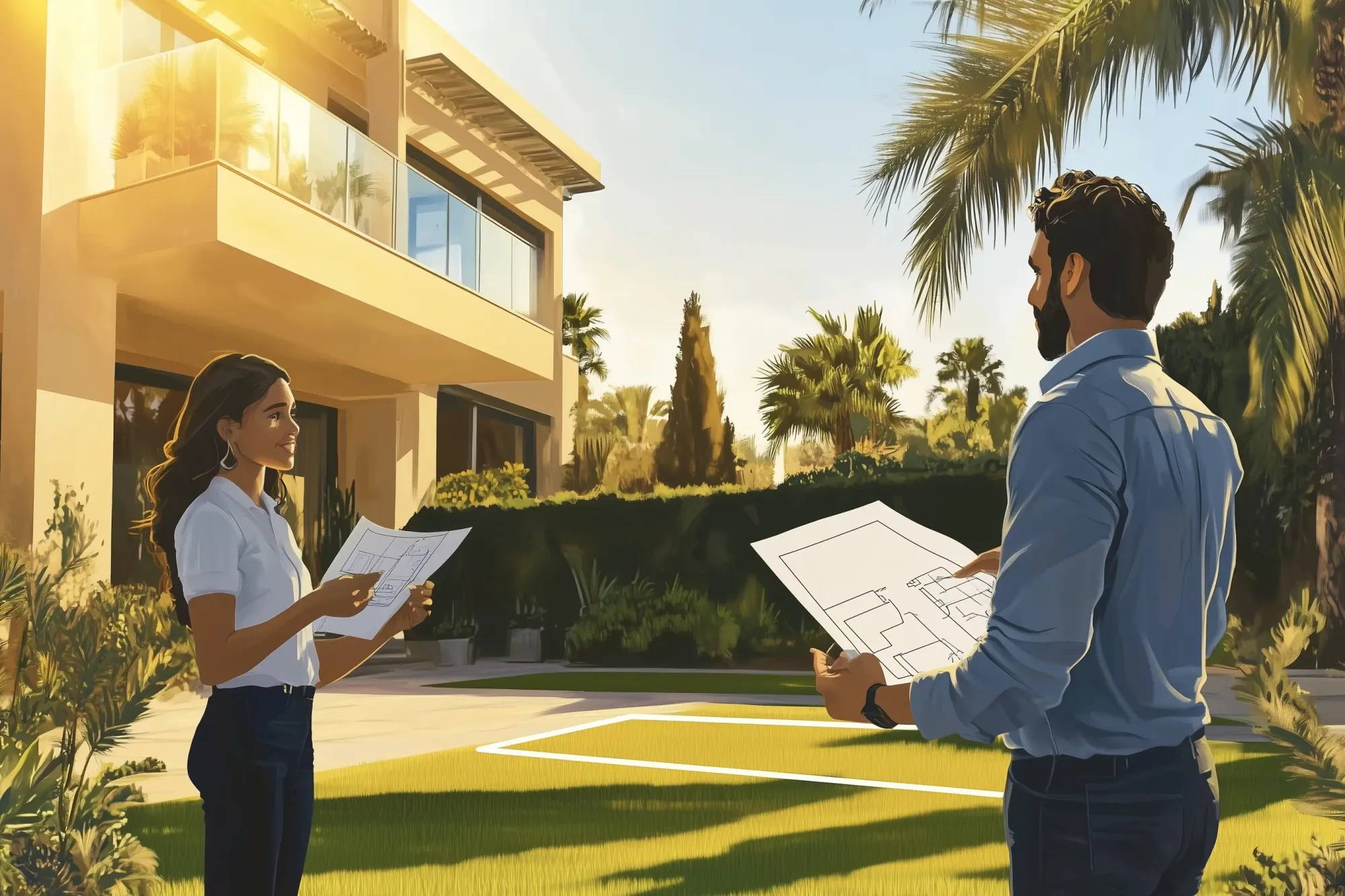
Understanding Dubai's Pool Permit Framework
Dubai's pool permit system operates through multiple agencies and approval levels, each addressing different aspects of safety, compliance, and community standards. The primary oversight comes from Dubai Municipality, which reviews structural plans, safety compliance, and building code adherence for all pool installations.
Community-level approvals add another layer, particularly in master-planned developments where homeowner associations or developer covenants may impose additional requirements beyond municipal standards. These community rules often address aesthetic standards, setback requirements, and noise considerations for pool equipment.
The permit system exists to prevent problems that create expensive consequences later. Proper structural review ensures pools won't damage foundations or neighbouring properties. Utility coordination prevents accidental damage to water, electrical, or telecommunications infrastructure. Safety compliance protects families and visitors from preventable accidents.
Dubai Municipality Requirements
Dubai Municipality serves as the primary regulatory authority for pool construction, reviewing plans for structural safety, building code compliance, and municipal standard adherence. Their review process examines foundation requirements, structural engineering, drainage provisions, and safety feature integration.
The municipality requires detailed architectural drawings showing pool dimensions, depths, equipment placement, and integration with existing structures. These drawings must be prepared by licensed professionals and demonstrate compliance with current building codes and safety standards.
Structural engineering reviews ensure pool construction won't compromise building foundations or create drainage problems affecting neighbouring properties. This review becomes particularly important in Dubai's sandy soil conditions, where improper excavation or water management can affect nearby structures.
Community and Developer Approvals
Many Dubai villa communities require additional approvals beyond municipal permits. These community-level requirements address aesthetic standards, equipment placement guidelines, and construction timing restrictions that maintain neighbourhood character and property values.
Communities like Emirates Living, Arabian Ranches, or Dubai Hills Estate typically have architectural review committees that evaluate pool designs for compliance with community standards. These reviews may address pool size relative to garden space, equipment visibility, lighting standards, and landscape integration requirements.
Some communities impose construction timing restrictions, limiting work hours or prohibiting construction during certain periods to minimize neighbour disruption. Understanding these requirements before planning helps avoid delays and community conflicts.
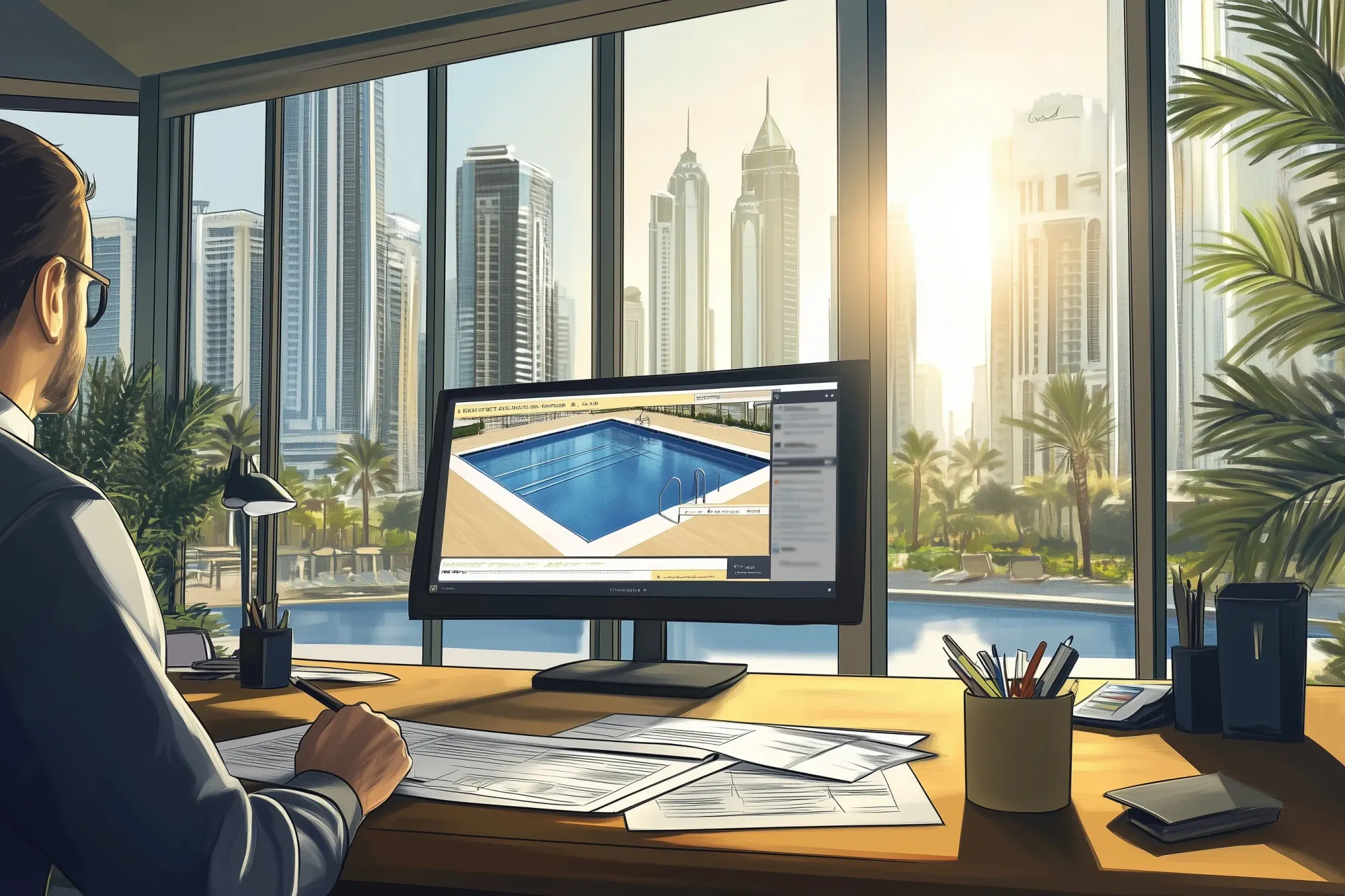
Required Documentation and Drawings
Successful permit applications require comprehensive documentation prepared by qualified professionals who understand Dubai's specific requirements and standards.
Architectural Drawings and Plans
Pool permit applications require detailed architectural drawings showing pool location, dimensions, depths, and integration with existing structures. These drawings must be prepared by licensed architects or engineers familiar with Dubai Municipality standards and submission requirements.
Plans must show accurate property boundaries, setback compliance, existing structures, proposed pool configuration, equipment placement, and drainage provisions. The level of detail required exceeds basic sketches - professional-quality drawings with proper scaling and technical specifications are essential.
Site plans must demonstrate adequate access for construction equipment, emergency vehicle access where required, and compliance with building setback requirements that vary by community and lot size.
Structural Engineering Documentation
Dubai Municipality requires structural engineering reviews for pool installations, particularly those involving significant excavation or proximity to existing foundations. Licensed structural engineers must prepare and sign drawings showing foundation details, soil analysis, and structural integrity provisions.
Engineering documentation addresses soil conditions, drainage requirements, structural loads, and potential impact on existing buildings. This review becomes particularly important for pools near villa foundations or in areas with challenging soil conditions.
The engineering review ensures pool construction won't create settlement issues, drainage problems, or structural stresses that could affect the main residence or neighbouring properties.
Safety and Compliance Certifications
Pool permits require documentation of safety feature compliance, electrical system reviews, and equipment installation standards. Licensed electrical engineers must review and approve electrical installations, particularly for underwater lighting, pump systems, and control equipment.
Safety documentation addresses pool depth markings, slip-resistant surfaces, emergency equipment access, and any required safety barriers or alarms. While Dubai doesn't mandate pool fencing for private residences, documentation must show compliance with general safety standards.
Equipment specifications and installation plans require professional review to ensure compliance with electrical codes, plumbing standards, and noise control requirements that affect neighbouring properties.
Utility Coordination Documentation
Pool installation requires coordination with existing utilities, including water, electricity, telecommunications, and waste management systems. Utility providers must review plans to prevent accidental damage during excavation and ensure adequate service capacity for pool systems.
DEWA (Dubai Electricity and Water Authority) requires notification and sometimes inspection of electrical installations for pool systems, particularly for heating, cooling, and lighting installations that represent significant electrical loads.
Telecommunications and cable providers need notification of excavation plans to prevent accidental service disruption that could affect entire neighbourhoods.
Step-by-Step Permit Application Process
Navigating Dubai's permit process efficiently requires understanding each step, required timelines, and potential complications that can extend approval periods.
Initial Consultation and Planning
Begin the permit process with a professional consultation to assess your specific site, community requirements, and design goals. Experienced contractors understand local requirements and can identify potential approval challenges before investing in detailed drawings and applications.
Quality contractors typically handle permit coordination as part of comprehensive project management. This approach ensures proper sequencing, complete documentation, and professional representation throughout the approval process.
Documentation Preparation Phase
Professional drawing preparation typically requires 2-3 weeks, depending on project complexity and professional availability. This phase includes site surveys, architectural drawings, engineering reviews, and utility coordination documentation.
Quality documentation preparation prevents application delays and revision requirements that extend approval timelines. Investing in thorough professional preparation proves more efficient than attempting to expedite inadequate documentation.
Site surveys must be current and accurate, reflecting any changes to property conditions since original construction. Outdated surveys can cause application delays and revision requirements.
Application Submission and Initial Review
Dubai Municipality typically requires 2-4 weeks for initial application review, depending on application complexity and current workload. Complete, professional applications receive faster processing than incomplete or amateur submissions.
Initial review identifies any documentation deficiencies, compliance issues, or revision requirements. Professional applications typically receive fewer revision requests, accelerating the overall approval timeline.
Communication during initial review often occurs through the submitting professional rather than directly with homeowners. Maintaining clear communication channels with your professional representatives ensures a rapid response to any questions or requirements.
Community Approval Coordination
Community approvals often proceed in parallel to municipal review but may require separate timelines and documentation. Some communities require applications before municipal submission, whilst others accept applications with pending municipal approval.
Community review timelines vary significantly between developments. Established communities with clear standards often provide faster approvals than newer developments that are still developing their architectural review processes.
Understanding community-specific requirements early prevents delays and ensures architectural plans comply with both municipal and community standards before final submission.
Final Approval and Documentation
Final permit approval typically occurs within 4-6 weeks of complete application submission, assuming no major revisions or complications arise. Final documentation includes approved drawings, permit certificates, and any special conditions or requirements.
Permit documentation must be available on-site during construction for inspection purposes. Some phases of construction require inspection and approval before proceeding to subsequent phases.
Final permit costs typically range from AED 10,000-20,000, including professional fees, municipal charges, and required deposits. Understanding total costs helps with project budgeting and prevents surprises during the approval process.
Costs and Fee Structure
Understanding permit-related costs helps with accurate project budgeting and prevents cost surprises that can affect overall pool project feasibility.
Municipal Fees and Charges
Dubai Municipality charges various fees for permit review, inspection services, and documentation processing. Base permit fees typically range from AED 2,000-5,000, depending on project scope and complexity.
Inspection fees apply for various construction phases, including excavation approval, structural inspection, electrical system review, and final completion certification. These fees typically total AED 1,000-3,000 depending on inspection requirements.
Security deposits may be required for certain types of construction, typically AED 5,000-10,000, refundable upon satisfactory project completion and final inspection approval.
Professional Service Fees
Architectural and engineering services for permit documentation typically cost AED 5,000-10,000, depending on project complexity and professional experience. This investment in quality documentation often prevents delays and revision costs that exceed initial professional fees.
Professional permit management services, where contractors handle the entire approval process, typically cost AED 3,000-8,000 as part of comprehensive project management. This service often provides better value than attempting independent permit navigation.
Expedited processing services may be available for time-sensitive projects but typically involve premium fees and may not guarantee faster approval if documentation requires revision.
Community and Developer Fees
Community architectural review fees vary significantly between developments. Established communities typically charge AED 500-2,000 for architectural review, whilst premium developments may charge higher fees for comprehensive review services.
Some communities require refundable deposits, ensuring compliance with construction standards and timeline requirements. These deposits typically range from AED 2,000-10,000, depending on community standards and project scope.
Special assessments or fees may apply for communities with enhanced standards, landscape requirements, or construction coordination services that maintain community character during construction periods.
Hidden Costs and Budget Considerations
Permit delays can create significant indirect costs through construction timeline extensions, material storage fees, and contractor scheduling conflicts. Planning realistic permit timelines prevents these avoidable expenses.
Revision requirements due to inadequate initial documentation can double permit costs and extend timelines significantly. Investing in quality professional services typically prevents these expensive complications.
Utility connection fees or upgrade requirements discovered during permit review can add unexpected costs. Professional utility coordination during planning identifies these requirements before final budgeting.
Common Permit Challenges and Solutions
Understanding frequent permit complications helps avoid delays and additional costs that frustrate many Dubai pool projects.
Documentation Deficiencies
Incomplete or inadequate documentation represents the most common cause of permit delays. Amateur drawings, missing engineering reviews, or outdated site information require revision and resubmission that extend approval timelines.
Professional documentation preparation prevents most deficiency issues but requires adequate time and investment in quality services. Rushing documentation preparation often creates delays that exceed the time saved through expedited preparation.
Communication gaps between homeowners, contractors, and professionals can result in drawings that don't reflect actual project goals or site conditions. Clear communication throughout documentation preparation ensures accurate representation.
Setback and Compliance Issues
Property setback violations represent frequent compliance problems that require design revisions or variance applications. Understanding setback requirements before final design prevents these expensive modifications.
Utility conflicts discovered during permit review can require design changes, additional engineering, or utility relocation that adds significant costs and delays. Professional utility coordination during initial planning identifies these issues early.
Safety compliance questions may arise during review, particularly for complex designs or special features. Understanding safety requirements during design prevents approval delays.
Community Coordination Problems
Conflicting requirements between municipal standards and community covenants can create approval complications requiring careful coordination and sometimes design compromises.
Community review delays often result from incomplete applications, unclear architectural review processes, or seasonal availability of review committees. Understanding community-specific processes prevents these delays.
Communication problems between municipal and community approval processes can create conflicting requirements or duplicated reviews that extend overall timelines unnecessarily.
Timeline Planning and Project Coordination
Realistic timeline planning prevents permit delays from affecting overall construction schedules and helps coordinate contractor availability with approval schedules.
Permit Process Duration
Complete permit approval typically requires 6-10 weeks from initial consultation through final documentation, assuming no major complications or revisions. This timeline includes professional documentation preparation, application submission, review periods, and final approval processing.
Expedited processing may be available, but it doesn't guarantee faster approval if documentation requires revision or compliance issues arise. Planning adequate time typically proves more efficient than attempting to rush inadequate preparation.
Seasonal variations can affect approval timelines due to professional availability, municipal workload, and community review committee schedules. Planning permit applications during less busy periods often results in faster processing.
Construction Coordination
Permit approval timing must coordinate with contractor availability, material delivery schedules, and seasonal construction considerations. Dubai's optimal construction months (November-March) represent peak demand periods requiring advance coordination.
Construction phase inspections require coordination between municipal inspectors, contractors, and project schedules. Delays in scheduling inspections can extend construction timelines and affect subsequent project phases.
Weather considerations affect both permit processing and construction scheduling. Planning construction during optimal weather periods requires permit approval well before seasonal deadlines.
Contingency Planning
Permit delays can affect contractor scheduling, material orders, and overall project timelines. Building contingency time into project schedules prevents permit delays from creating expensive complications.
Alternative timeline scenarios help manage expectations and maintain project momentum despite permit processing variations. Flexible scheduling often prevents minor delays from becoming major disruptions.
Communication protocols with contractors, professionals, and approval authorities ensure rapid response to questions, requirements, or complications that could extend approval timelines.
Working with Professionals vs. DIY Approaches
The complexity of Dubai's permit requirements often justifies professional management, but understanding the trade-offs helps make informed decisions about permit handling approaches.
Professional Permit Management Benefits
Experienced contractors understand Dubai's permit requirements, documentation standards, and approval processes that prevent delays and complications common with independent applications.
Professional relationships with municipal staff, community administrators, and utility coordinators often facilitate faster processing and better communication during review periods.
Quality professionals handle revision requirements, inspection coordination, and compliance questions that would challenge homeowners attempting independent permit navigation.
Professional management often costs less than DIY approaches when considering time investment, potential delays, revision costs, and the value of avoiding permit-related complications.
DIY Permit Considerations
Independent permit applications require significant time investment, understanding of technical requirements, and availability during business hours for coordination and communication.
Documentation preparation requires professional architectural and engineering services regardless of who manages the application process. Homeowners cannot prepare technical drawings or engineering reviews independently.
Communication with municipal staff and utility coordinators requires technical knowledge and persistence that many homeowners find challenging whilst managing other project responsibilities.
Mistakes in DIY permit applications can create delays, additional costs, and complications that exceed professional management fees many times over.
Hybrid Approaches
Some homeowners choose hybrid approaches where professionals prepare documentation whilst homeowners manage application submission and coordination. This approach can provide cost savings but requires significant time investment and technical understanding.
Professional consultation for documentation preparation combined with homeowner application management can work for experienced homeowners with adequate time availability and technical competence.
Quality contractors often provide permit coordination as part of comprehensive project management that includes design, permitting, construction, and completion. This integrated approach often provides better value than separate permit management.
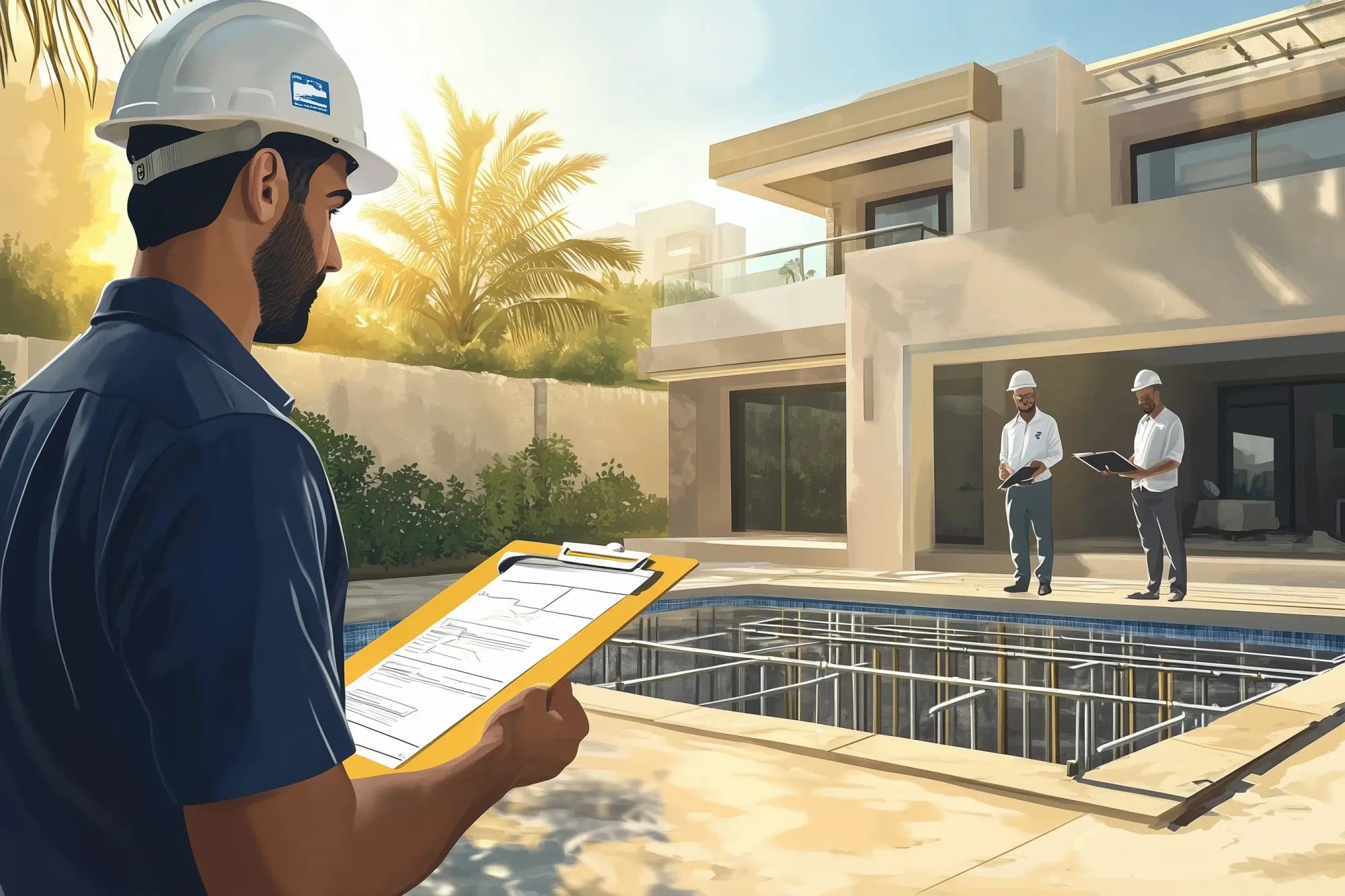
Inspection Requirements and Compliance
Pool construction in Dubai involves multiple inspection phases that ensure safety compliance, building code adherence, and permit condition fulfilment.
Construction Phase Inspections
Excavation inspection ensures proper depth, dimensions, and utility protection before proceeding with structural work. This inspection prevents problems that would be expensive to correct after concrete placement or structural completion.
Structural inspection verifies steel placement, concrete quality, and foundation adequacy before finishing work begins. This inspection ensures long-term structural integrity and compliance with engineering specifications.
Electrical inspection reviews underwater lighting, pump systems, control equipment, and safety compliance before pools can be filled and operated. This inspection ensures safety and code compliance for electrical systems.
Final Completion Certification
Final inspection encompasses overall project compliance, safety feature functionality, and adherence to approved drawings and specifications. This inspection ensures the completed project matches approved documentation.
Safety compliance verification includes testing of electrical systems, verification of safety equipment, and confirmation of proper installation according to approved plans.
Completion certification enables legal pool operation and satisfies permit requirements that affect property documentation and future sale considerations.
Ongoing Compliance Requirements
Some communities require periodic compliance verification, ensuring continued adherence to community standards and safety requirements throughout pool ownership.
Equipment modifications or additions may require additional permits or inspections, ensuring continued compliance with safety and building code requirements.
Property sale documentation often requires verification of proper permitting and inspection completion, making permit compliance important for future marketability.
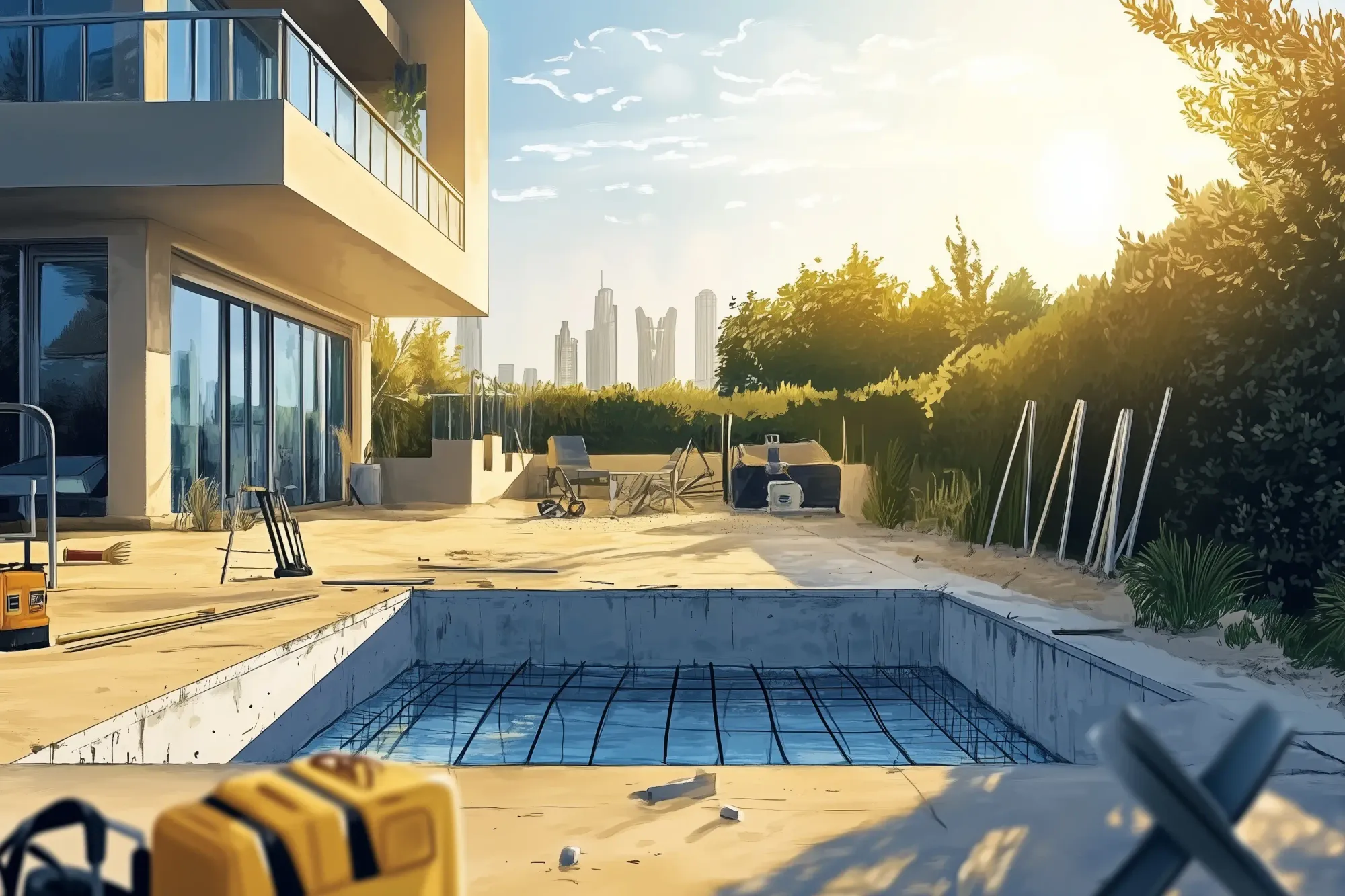
Consequences of Non-Compliance
Understanding the serious consequences of unpermitted pool construction motivates proper permit compliance and prevents expensive legal and practical complications.
Legal and Financial Penalties
Unpermitted construction can result in significant fines, forced removal orders, and legal complications that far exceed permit costs. Dubai Municipality actively enforces building code compliance with substantial penalties for violations.
Property sale complications arise when unpermitted improvements require legal resolution before title transfer can occur. These complications can delay sales, affect property values, and create expensive legal costs.
Insurance coverage may be affected by unpermitted construction, potentially voiding coverage for damages related to unpermitted improvements or creating coverage disputes.
Practical Construction Problems
Construction without permits eliminates oversight that prevents safety problems, building code violations, and structural issues that create expensive repairs and potential liability.
Utility damage during unpermitted excavation can result in service disruption, repair costs, and legal liability that far exceeds permit coordination costs.
Quality control problems without professional oversight can create long-term maintenance issues, safety hazards, and expensive corrections that proper permitting would prevent.
Property Value and Marketability Impact
Unpermitted improvements may not add value to property and can actually detract from marketability due to legal complications and buyer concerns about code compliance.
Permit violations discovered during property inspections can become negotiation points that reduce sale prices or create expensive remediation requirements.
Future modification or repair work may require bringing entire installations up to current code standards, creating expensive upgrade requirements for simple maintenance projects.
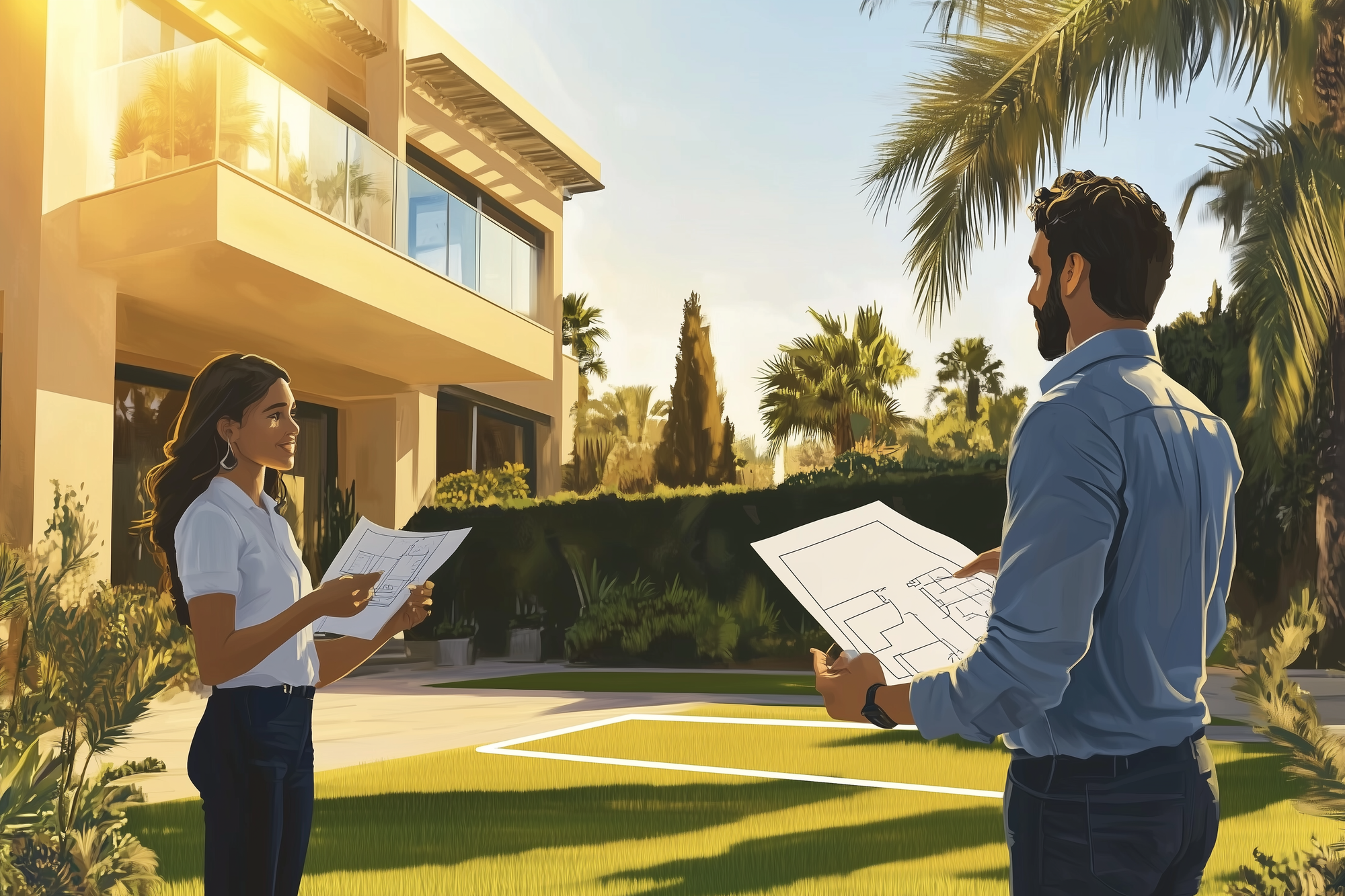
Understanding Dubai Pool Permits
Pool permits in Dubai typically represent an important step in legal compliance, safety assurance, and long-term property value protection. While the process usually requires time, documentation, and professional coordination, proper permitting generally helps prevent expensive complications and ensures your pool investment enhances rather than complicates your property ownership.
Understanding common permit requirements early in planning can enable realistic timeline development, more accurate cost budgeting, and better contractor coordination, though actual requirements should always be verified with qualified professionals. Professional management typically provides better value than DIY approaches, given the complexity of Dubai's approval requirements and the serious consequences of permit problems.
Quality contractors integrate permit management with comprehensive project coordination, ensuring approvals align with construction schedules whilst maintaining compliance throughout the installation process. This professional approach typically provides smoother projects and better long-term outcomes than attempting independent permit navigation
Ready to navigate Dubai's pool permit requirements with confidence?
Check Trusty connects you with verified pool installation experts like Pools by Design, Exterior Space Landscape Works and Secret Gardens - professionals who understand Dubai's approval processes and handle permit coordination as part of comprehensive project management that delivers legally compliant, properly permitted pools without the stress and complications of independent permit navigation.
Your pool project deserves the foundation of proper permits that ensure safety, compliance, and long-term value. Whether you're beginning initial planning or need permit guidance for an existing project, experienced professionals ensure your approvals proceed smoothly whilst protecting your investment and property interests.
Whether you're planning permit applications during this winter's optimal timeline, need urgent guidance for permit complications, or want to understand requirements before committing to pool installation, proper permit planning ensures your project proceeds legally and successfully through Dubai's comprehensive approval requirements.
Legal Disclaimer: This article provides general information based on research and industry experience. It is not legal advice and should not be relied upon for making permit decisions. Requirements can change, vary by location and circumstances, and may have been updated since publication. Always consult with qualified professionals and verify current requirements directly with Dubai Municipality, your community authorities, and licensed contractors before making any decisions about pool installation.

